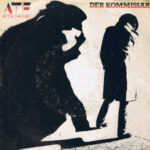 When it comes to iconic 80s songs, few tracks stand out quite as prominently as “Der Kommissar”—a song that had two notable versions: one by Falco and another by After the Fire. While both versions are linked to the same original song, there’s a clear divide among fans and critics about which rendition truly captures the essence of the track. After the Fire’s version has often been overshadowed by Falco’s, but a closer look reveals that it is, in fact, the superior rendition of this memorable song.
When it comes to iconic 80s songs, few tracks stand out quite as prominently as “Der Kommissar”—a song that had two notable versions: one by Falco and another by After the Fire. While both versions are linked to the same original song, there’s a clear divide among fans and critics about which rendition truly captures the essence of the track. After the Fire’s version has often been overshadowed by Falco’s, but a closer look reveals that it is, in fact, the superior rendition of this memorable song.
Released in 1982, “Der Kommissar” first appeared as a track by the Austrian artist Falco, and it was an instant success, blending new wave, synth-pop, and rap elements that felt fresh for the time. However, it’s After the Fire’s version, released a year later in 1983, that outshines the original in several key areas. From its musical arrangement to its energy and even the way it translates the song’s message to a wider audience, After the Fire’s interpretation is a masterclass in how to take a concept and elevate it.
1. The Power of Translation: Reaching a Broader Audience
One of the most crucial differences between Falco’s original version and After the Fire’s cover lies in the language of the lyrics. Falco’s version is performed in German, which undeniably lends it authenticity, especially for those who understand the language. However, the choice to perform the song in German limited its reach primarily to German-speaking audiences or those familiar with the language. In contrast, After the Fire’s version is performed in English, making it accessible to a much wider audience—particularly in the United States and the UK, where English was the primary language.
Though the meaning of “Der Kommissar” can still be inferred from Falco’s version by non-German speakers, After the Fire’s English rendition brought clarity to the lyrics and message of the song. The track’s storyline, which focuses on street life, criminal activity, and government surveillance, resonates more universally when translated, particularly in the context of the Cold War era and its cultural concerns about authority and repression. The English lyrics give it a sense of global relevance that Falco’s German version, while brilliant, might not have been able to achieve as easily.
2. Musical Arrangements: A More Polished and Accessible Sound
Musically, After the Fire’s version of “Der Kommissar” takes the basic framework of Falco’s original and transforms it into a more dynamic and polished piece. Falco’s version features heavy use of synthesizers and new wave influences, which were highly popular at the time but can feel somewhat dated when compared to the lush and more refined production of After the Fire’s cover.
The British band’s version injects a level of rock energy into the song that Falco’s version lacks. The guitars are more prominent, and the rhythm section is more aggressive, which creates a much bouncier and catchier version of the song. After the Fire’s take is still rooted in the 80s new wave sound but with more polished pop appeal, making it easier for the song to break out beyond the underground and reach mainstream success.
Where Falco’s version is a bit cooler and more subdued, After the Fire’s version is a bigger, more extroverted performance. The energetic guitar riffs that punctuate the song’s driving rhythm and the vocals that seem to sing with a greater sense of urgency add an extra layer of intensity to the track. The way After the Fire’s musicians play with tempo and dynamics creates a much more thrilling, engaging experience for the listener. It has the feeling of a song that’s meant to be heard live, with an anthemic quality that easily draws the listener in.
3. Vocal Performance: Energy and Character
Both Falco and After the Fire’s lead singer John Perry bring their own distinct vocal style to “Der Kommissar.” However, there’s something about Perry’s performance that gives the song a unique intensity and charisma that resonates deeply.
Falco’s vocal delivery in the original version is cool and somewhat distant. He uses a mysterious, deadpan style that fits his persona and the intriguing nature of the song, but this style can feel a bit detached from the energy of the music. It works, but it’s hard to argue that it has the same charismatic punch as the version by After the Fire.
John Perry, on the other hand, injects more urgency and character into the vocals. His delivery is more urgent, more energetic, and more personable. He sounds as though he’s speaking directly to the listener, which gives the song more of a human touch. When Perry sings, there’s a feeling of real stakes, and this is especially noticeable in the song’s chorus, where he drives the point home: “Don’t turn around, uh-oh! Der Kommissar’s in town.” Perry’s tone is full of drive and passion, and it doesn’t feel as though he’s just delivering the lyrics; he’s embodying them. This delivery connects with listeners on a visceral level, giving the song a high-octane energy that was essential for the international success the song would achieve.
4. Chart Success and Legacy
Despite Falco’s original version of “Der Kommissar” charting in several countries, including a significant top 10 hit in Austria, it was After the Fire’s English-language version that found mainstream success in North America. The band’s cover hit #1 on the Billboard Dance Chart and reached the top 10 of the Billboard Hot 100, which is a significant achievement in its own right. This success cannot be understated, especially in the context of the competitive and ever-changing music landscape of the 80s.
After the Fire’s version of “Der Kommissar” became a radio staple, and its infectious chorus and catchy hooks cemented its place as a quintessential new wave anthem. Even today, the song is still played in retro playlists and is often remembered as a standout from the 1980s.
While Falco’s version of “Der Kommissar” might be a more personal and artistic interpretation, After the Fire’s take is the one that broke through to international audiences. The band’s version remains the more popular and accessible of the two, and it’s the one that’s likely to be remembered by most listeners when they think of this song.
5. Why After the Fire’s Version Still Reigns Supreme
It’s not just the translation of the lyrics, the dynamic performance, or the polish of the production that makes After the Fire’s version superior—it’s the way that everything comes together to create a song that stands the test of time. While Falco’s original may hold a certain historical and cultural significance, it is After the Fire’s version that captivates the energy of the era, with a more universal appeal that resonates across cultures and languages.
What’s undeniable is that After the Fire’s rendition of “Der Kommissar” offers something more dynamic and engaging—from its musical arrangement to its vocal energy to its sheer ability to captivate the listener. It’s a song that hits harder, stays with you longer, and continues to feel fresh even decades after its release.
For all these reasons, it’s clear: After the Fire’s version of “Der Kommissar” is not just a cover; it’s a superior version that has carved its own place in music history.
This post has already been read 101 times!









